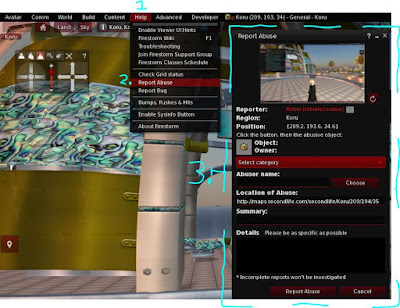MUV601 - Robin Le Couteur - Assignment 2, blog 2 -2018
Second Life Community Standards
In this blog I’ll be talking
about the Second Life community standards. These standards are clearly
explained in this post: https://community.secondlife.com/forums/topic/403539-community-standards/
The official document
containing the SL community standards can be found at this link: https://www.lindenlab.com/legal/community-standards
If you violate these standards, you can be suspended, and even permanently banned from Second Life if you repeatedly offend.
The six community standards
are as follows:
- Intolerance
This standard covers intolerance
in SL. Intolerance covers the following: “The
use of derogatory or demeaning language or images in reference to another
Resident's race, ethnicity, gender, religion, or sexual orientation is never
allowed in Second Life.”
Basically, if you belittle or
treat anyone poorly through derogatory language or visuals in reference to
their gender, religion, ethnicity etc. then you are breaching this standard
- Harassment
This standard covers harassment
in many forms. “Communicating or behaving
in a manner which is offensively coarse, intimidating or threatening,
constitutes unwelcome sexual advances or requests for sexual favors, or is
otherwise likely to cause annoyance or alarm is Harassment”. Basically, you
are expected act and talk in a respectful and appropriate manner
- Assault
In Second Life, areas can be
marked as safe or unsafe. This standard applies to safe areas. “Assault in Second Life means: shooting,
pushing, or shoving another Resident in a Safe Area (see Global Standards
below); creating or using scripted objects which singularly or persistently
target another Resident in a manner which prevents their enjoyment of Second
Life.”
To adhere to this standard,
you shouldn’t be a nuisance to others by bumping into them or attacking them in
some way.
- Disclosure
This standard covers user
privacy. Basically you should not disclose any personal information of fellow
residents unless they have given you permission, or if the information is made
public through their profile. It is also a breach of this standard if you
remotely monitor or share conversation logs without the permission if the
people involved.
- Adult
Regions, Groups, and Listings
In
Second Life, adult content is restricted to particular areas that are
designated as “Adult”. As the standard specifies, “any Adult
content, activity, or communication, that falls under our Adult
Maturity Definition must be on regions designated as
"Adult," and will be filtered from non-verified accounts.” If adult content, activity,
or communication is seen outside of these “Adult” designated area, it is a
violation of this standard.
- Disturbing
the Peace
This
standard covers disruptive behavior in Second life. If you disrupt events, spam
advertising content, spam repetitive sounds, use objects that follow people
around or self-spawn, or use any other objects that can inhibit server performance,
you are disturbing the peace and therefore violating this standard
How to avoid violating the standards
To avoid violating these
standards it is always important to check the rules of the area you are in to
avoid breaching area specific standards. You can basically avoid breaching most
of the standards by generally treating people with the same respect as you
would in real life, because a lot of the standards are just common sense in the
real world. SL is not a game, so you have to remind yourself to act as you
would in a real situation. Otherwise you can just make sure that you thoroughly
read through the standards and understand them before going out into the world
of Second Life.
What to do if you think someone is
violating the standards
If you think someone is
violating the community standards, there is tool in SL called the Abuse
Reporter tool that you can use to report violations with. It can be found
listed in the Help menu as shown in the screenshot below:
As shown, when you open the
tool it contains options to select an object if the abuse is caused by an
object, then there are fields for selecting the name of the abuser, the
location that the abuse occurred, a summary of the abuse, and a large field for
recording specific details about the abuse. You can then click the ‘Report
Abuse’ button to submit the report.
It must also be noted that
the report should be complete otherwise it won’t be investigated.


Comments
Post a Comment